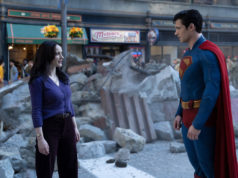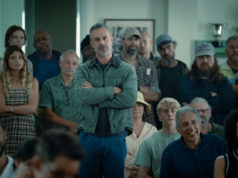Because The Kids Are All Right played in Dallas before it came here, I was able to see the film three times before I wrote it up (a luxury that I very seldom enjoy), and I’ve been poring over it the way other people have been obsessively re-watching Inception. (If you’d rather have Inception links, scroll down to the bottom of this post.) As a result, I have a bunch of leftover thoughts about the movie that I couldn’t get into my review, so I thought I’d post them here. WARNING: Plot spoilers ahead.
Mark Harris in Entertainment Weekly calls it “bitterly ironic” that the best recent movie about marriage is about a couple who can’t legally marry, but The Kids Are All Right never answers the question: Are Nic and Jules legally married? They live in California, and there was a window when they could have gotten hitched and had it recognized by the state. I didn’t see any wedding pictures in the background (which would probably still be on display, because any marriage would have had to take place fairly recently), and I didn’t see them wearing any wedding rings. Then again, I could imagine this couple legalizing their union for prudent reasons without making a big production out of it. Jules does tell Paul, “I’m married,” but does that mean in the legal sense or just that she considers herself married? I feel like this movie needed to tell us more on this specific point.
Less important loose ends: Nic and Jules call each other “chicken” and “pony” late at night when they’re in bed together. It’s weird, but the private references that other couples share are always weird. Also, the movie ends with Joni going off to college, but the movie never says where that is. The only clue is Nic mentioning that it’ll take about eight hours to drive there. Calculating driving time from L.A. (and assuming that her estimate is pretty much correct), it seems that the most likely candidate is the University of Arizona. Go Wildcats! I was initially confused at Paul being surprised to discover that Joni is named after Joni Mitchell. After all, it’s not as if there are lots of other Jonis running around out there. I figured this out, though: He never sees her name written out, and there’s one phone conversation where he calls her “Joan.” He thinks her name is Joan, and that everyone else calls her “Joanie.”
I usually ignore drink references in movies, but as I mentioned near the end of my review, this movie is as specific about its wine as Sideways and Bottle Shock. I am no wine expert, so perhaps one of my readers who knows their wine can tell me about the food pairings or whether the choice of wine has any resonance with the dramatic situations. To wit: 1) The movie opens with a family dinner, with Nic and Jules drinking Fiddlehead to go with salad and what looks like succotash or some Southwestern dish with corn in it. The scene merely sets the tone and introduces the characters as they chatter about family business. 2) During the incredibly awkward lunch where Nic and Jules meet Paul, he brings over a bottle of 1986 Petite Syrah to go with hot dogs. It’s not clear if he knows in advance what they’re serving. Even though Nic doesn’t like Paul, she still pronounces his wine “excellent.” 3) When the couple are dining at a restaurant with two straight friends of theirs, Nic is drinking a Seavey Cabernet when she goes off on her organic farming rant. It’s not clear what meat dish Nic is eating with it; it must be pork or chicken, because surely she wouldn’t be gauche enough to drink red wine with fish. 4) At the dinner party at Paul’s house, he serves a “bitchin’ ” (his word) 1998 Alma Rosa Pinot Noir with a very rare steak. Nic doesn’t get to drink it until after she discovers that Jules has cheated on her, and she imbibes the wine silently while trying to process the information.
Dana Stevens’ review of the film on Slate teases out gardening as a metaphor in this movie. I’m all over the metaphors when I’m watching science fiction or horror or fantasy-adventure movies, but I don’t do so well detecting them when they’re in relatively realistic dramas like this one. I can’t believe it took me three viewings before I noticed the “JLN” tattoo on the inside of Jules’ wrist, which is visible in the photo that accompanies my review. I’ll let you work out what “JLN” stands for.
Here’s one theme that I did pick up on: What’s the deal with Jules’ vocabulary? I mentioned her use of the word “Asian-y.” Early in the movie we see her playing Scrabble with Joni and trying to play “zoomer” as a word over Joni’s protests. Then there are the instances where she refers to buying her truck “super-cheap” and then later describing her back as “super-achy.” At the same time, she uses the word “fecund” correctly (and shortly after the “Asian-y” reference), which makes Paul note that it’s not a word that one hears every day. I think all this plays into my theory that Jules is originally from somewhere far down the economic ladder. I don’t think she grew up in a California trailer park, but it was probably some place not too far removed from one. She mentions meeting Nic at UCLA, but we’re never told that she graduated. In fact, she says she quit architecture school. Then again, if she dropped out, the kids probably wouldn’t be so surprised to discover that Paul is a college dropout, and Nic would probably be less willing to sneer at him in private with Jules over this. Whatever her background, it sure sounds like Jules is trying to overcompensate intellectually. Hmm, sounds familiar.
Finally, I note that in her previous film Julianne Moore played a character who was married to a man and cheating on him with a woman. Here, it’s the other way around. I have no comment on this. Just wanted to take note.
Fine, you want Inception links? Here’s a cool and much-linked-to graphic illustrating the timeline of the film. One architecture blogger reviews the movie’s architecture. Musicians have noticed a buried reference to Edith Piaf’s “Non, je ne regrette rien” in Hans Zimmer’s score. Is the movie a commentary on the filmmaking process, or is it structured more like a video game? And here’s a mash-up of Inception with Toy Story 3.











